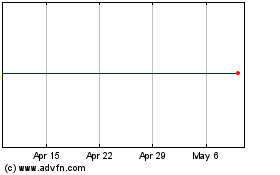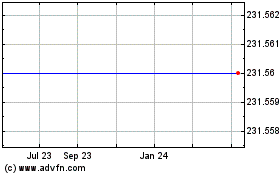Lack of data is single greatest challenge for UK financial sector to address climate risk over next five years, reveals new s...
May 26 2021 - 7:00AM

The availability of data is the single greatest test firms expect
to face over the next five years in order to address climate risk,
according to a survey of leading financial institutions by Willis
Towers Watson. In addition to 80% of respondents reporting data as
their top concern in the transition to a Net Zero economy,
difficulty in making quantitative assessments (75%) and
insufficient expertise in the actions required (62%) were also
revealed as major challenges.
Conducted as part of Willis Towers Watson’s
Climate Risk and Financial Stewardship Summit, the survey polled
122 organisations including global banks, insurers, wealth and
asset managers to gain fresh insights on progress made to assess
and manage the impact of climate risk on their business.
Looking across the same five-year timeframe, few
organisations who took part in the survey expect the level of risk
associated with climate change to diminish, with more respondents
(40%) predicting today’s level of risk facing their business will
escalate over time.
With the pace of change far behind what is
needed to keep global temperatures from exceeding 1.5°C of
pre-industrial levels, survey respondents said that implementing a
strategy to achieve Net Zero is the most common challenge to making
this commitment (43%), followed by a lack of tools or data
(32%).
In addition to future climate-related challenges
facing the financial sector over the next five years, the survey
looked at issues senior decision makers are having to deal with
right now. Respondents cited transition (75%), reputational (63%)
and social responsibility (57%) risks their organisations are
prioritising today in order to bridge the gap and achieve Net Zero
emissions.
Rowan Douglas, Head of Willis Towers Watson’s
Climate and Resilience Hub, said: “Future climate risks are
unprecedented and systemic, and the magnitude of the challenge is
so huge and the moment so late that every lever is being explored
to turn economies to meet the Paris targets. While the financial
sector is well placed to take a lead, climate-related risk not only
needs to be integrated into day-to-day risk management but also to
steer the whole economic transition to a low-carbon and resilient
future.”
Research from Carbon Disclosure Project (CDP)
reveals the extent to which further action across company value
chains is required, with nearly half (49%) of the world’s 500
biggest companies yet to conduct any analysis of how their
portfolio impacts the climate. This is despite portfolio emissions
of global financial institutions being on average over 700 times
larger than direct emissions, according to CDP data.
Douglas said: “We are seeing an evolution in
what Net Zero finance means for the financial sector and its
stewardship role in a whole economy transition towards a climate
resilient future. Meanwhile pressure from ambitious new climate
targets and scrutiny from central banks, regulators, investors and
the wider public continues to increase. To continue to thrive,
financial institutions will need to adapt and align their
portfolios with a Net Zero carbon world.”
The Climate Risk and Financial Stewardship
Summit also follows the recent launch of Climate Transition
Pathways, Willis Towers Watson’s accreditation framework that is
designed to provide insurers with a consistent approach to
identifying organisations that have robust transition plans aligned
to the Paris Agreement and science-based targets for reducing
global emissions.
About the Climate and Resilience
HubThe Climate and Resilience Hub (CRH) is the focal point
for our climate expertise and capabilities, pooling knowledge from
across our people, risk and capital businesses and from our
collaborations to deliver climate and resilience solutions in
response to a range of regulatory, investor, consumer, employee and
operating pressures. Under the Climate Quantified™
brand we deliver analytics, advice and transactions to enable
corporate, finance and public sector institutions to embrace the
climate decade ahead.
About Willis Towers
WatsonWillis Towers Watson (NASDAQ: WLTW) is a leading
global advisory, broking and solutions company that helps clients
around the world turn risk into a path for growth. With roots
dating to 1828, Willis Towers Watson has 45,000 employees serving
more than 140 countries and markets. We design and deliver
solutions that manage risk, optimize benefits, cultivate talent,
and expand the power of capital to protect and strengthen
institutions and individuals. Our unique perspective allows us to
see the critical intersections between talent, assets and ideas —
the dynamic formula that drives business performance. Together, we
unlock potential. Learn more at willistowerswatson.com.
Media contactAndrew Collis +44 (0) 7932 725267
| andrew@acolliscommunications.comMiles Russell +44 (0) 7903 262118
| Miles.Russell@WillisTowersWatson.com
Willis Towers Watson Pub... (NASDAQ:WLTW)
Historical Stock Chart
From Mar 2024 to Apr 2024

Willis Towers Watson Pub... (NASDAQ:WLTW)
Historical Stock Chart
From Apr 2023 to Apr 2024
